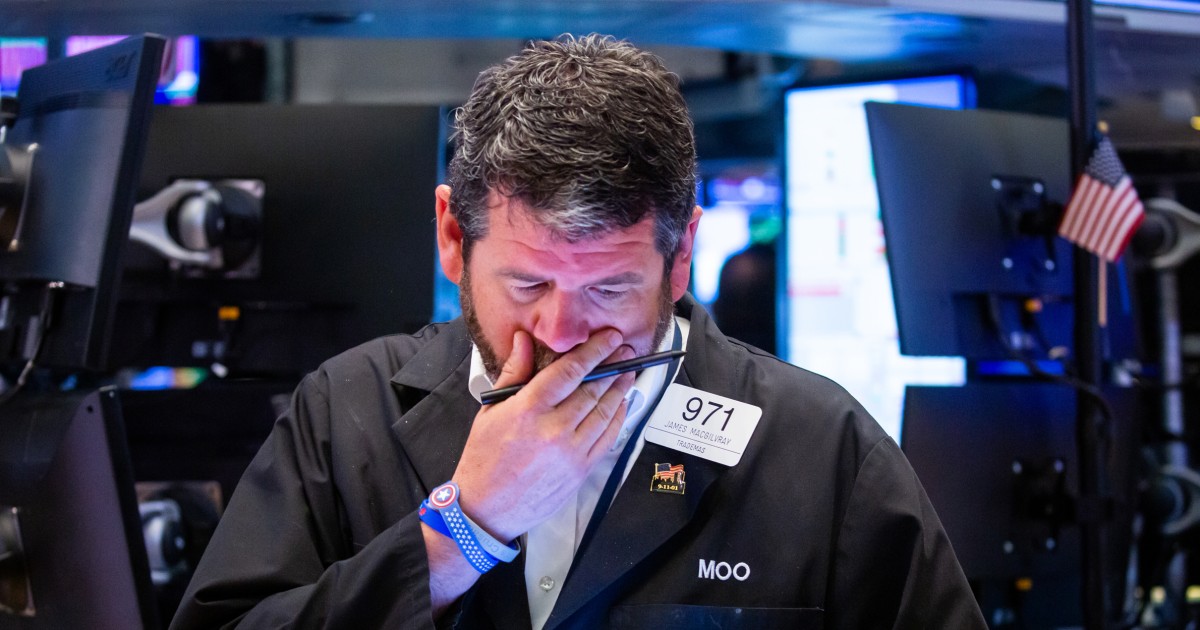
Stocks tumbled Monday, pushing the S&P 500 back into bear market territory, as the major averages came off their worst week since January.
The Dow Jones Industrial Average dropped 890 points, or 2.8%, the S&P 500 fell 3.8% and the Nasdaq Composite tumbled 4.5%.
The S&P 500 hit a new intraday low for the year and its lowest level since March 2021. The benchmark is off nearly 22% from its record, back in bear market territory after trading there briefly on an intraday basis about three weeks ago.
The benchmark now sits more than 20% from its January record close with all stocks trading in the red. If it finishes there on Monday, it will confirm a bear market to many on Wall Street.
“The odds of a ‘June Swoon’ straight to 3,400 have gone up significantly, in our view,” wrote Jonathan Krinsky, technical analyst for BTIG. The S&P 500 closed Friday at 3,900.86.
“We thought a momentum reversion where winners got bought and losers sold would create chop at the index level, but last week is a reminder that the risk continues to be to the downside,” Krinsky added.
Monday’s sell-off was broad-based, with roughly 26 New York Stock Exchange-listed stocks trading lower for every advancer.
Shares of Boeing, Chevron and Dow fell more than 7%, 5%, and 4.8%, respectively, dragging down the Dow. Beaten-up tech shares also took a hit with Netflix, Amazon and Nvidia down more than 6% as the Nasdaq touched a fresh 52-week low and its lowest level since November 2020.
Travel stocks also slipped on Monday, with Carnival Corporation and Norwegian Cruise Line down about 10% each. Delta Air Lines and United also fell more than 7% and 8%, respectively.
All major S&P 500 sectors dipped into the red, with energy and consumer discretionary down 5% and 3.8%, respectively.
Meanwhile, short-term rates jumped as investors still reeling from a hotter-than-expected inflation report on Friday braced for the Federal Reserve to raise rates later in the week.
The 2-year Treasury yield rose by 17 basis points to more than 3.22% Monday, reaching its highest level since 2007 as investors bet the Fed may have to get even more aggressive to squash inflation. At one point in the session, the 2-year rate traded above its 10-year counterpart for the first time since April, a so-called yield curve inversion seen as an indicator of a recession.
The moves came after the major averages last week posted their biggest weekly declines since late January as investors grew increasingly concerned rising inflation will tip the economy into a recession.
The Dow and S&P 500 fell 4.6% and 5.1%, respectively, while the Nasdaq Composite lost 5.6%. A chunk of those losses came Friday, when hotter-than-expected U.S. inflation data spooked investors. The Dow dropped 880 points, or 2.7%. The S&P 500 and Nasdaq lost 2.9% and 3.5%, respectively.
Meanwhile, short-term rates jumped as investors still reeling from a hotter-than-expected inflation report on Friday braced for the Federal Reserve to raise rates later in the week.
The 2-year Treasury yield rose by 17 basis points to more than 3.22% Monday, reaching its highest level since 2007 as investors bet the Fed may have to get even more aggressive to squash inflation. At one point in the session, the 2-year rate traded above its 10-year counterpart for the first time since April, a so-called yield curve inversion seen as an indicator of a recession.
The moves came after the major averages last week posted their biggest weekly declines since late January as investors grew increasingly concerned rising inflation will tip the economy into a recession.
The Dow and S&P 500 fell 4.6% and 5.1%, respectively, while the Nasdaq Composite lost 5.6%. A chunk of those losses came Friday, when hotter-than-expected U.S. inflation data spooked investors. The Dow dropped 880 points, or 2.7%. The S&P 500 and Nasdaq lost 2.9% and 3.5%, respectively.
The Bureau of Labor Statistics reported Friday that the U.S. consumer price index rose last month by 8.6% from a year ago, its fastest increase since December 1981. That gain topped economists’ expectations. The so-called core CPI, which strips out food and energy prices, also came in above estimates at 6%.
Gasoline prices topped $5 a gallon over the weekend, further fanning fears over rising inflation and falling consumer confidence.
Bitcoin tumbled below $24,000 on Monday after ending Friday above $29,000 as risk-averse investors dumped crypto amid rising rates.
“The cryptocurrency bitcoin has been a great gauge of investors’ risk threshold for equities,” wrote JC O’Hara, chief market technician at MKM Partners. “Plenty of longs who bought in last year are still trapped, and thus we could easily see a pullback to 19,500. That would be a bearish read through for stocks.”
The Fed is expected to announce at least a half-point rate hike on Wednesday. The Fed has already raised rates twice this year, including a 50-basis-point (0.5 percentage point) increase in May in an effort to stave off the recent inflation surge. Following Friday’s CPI report, some economists believe the Fed could even raise rates by 0.75% this week.
“May’s CPI report showed scant signs of inflation peaking, though we still expect peaking soon. The report also suggests a more hawkish Fed and higher recession risk,” wrote Ed Yardeni, president of Yardeni Research.
“Investor and consumer sentiment both have soured. But this time, pervasive bearishness may not be as useful a contrarian bullish signal as in the past,” he said, adding that the firm now sees a 45% chance of a “mild recession.” That’s up from the previous forecast of 40%.
Source: | This article originally belongs to Nbcnews.com










